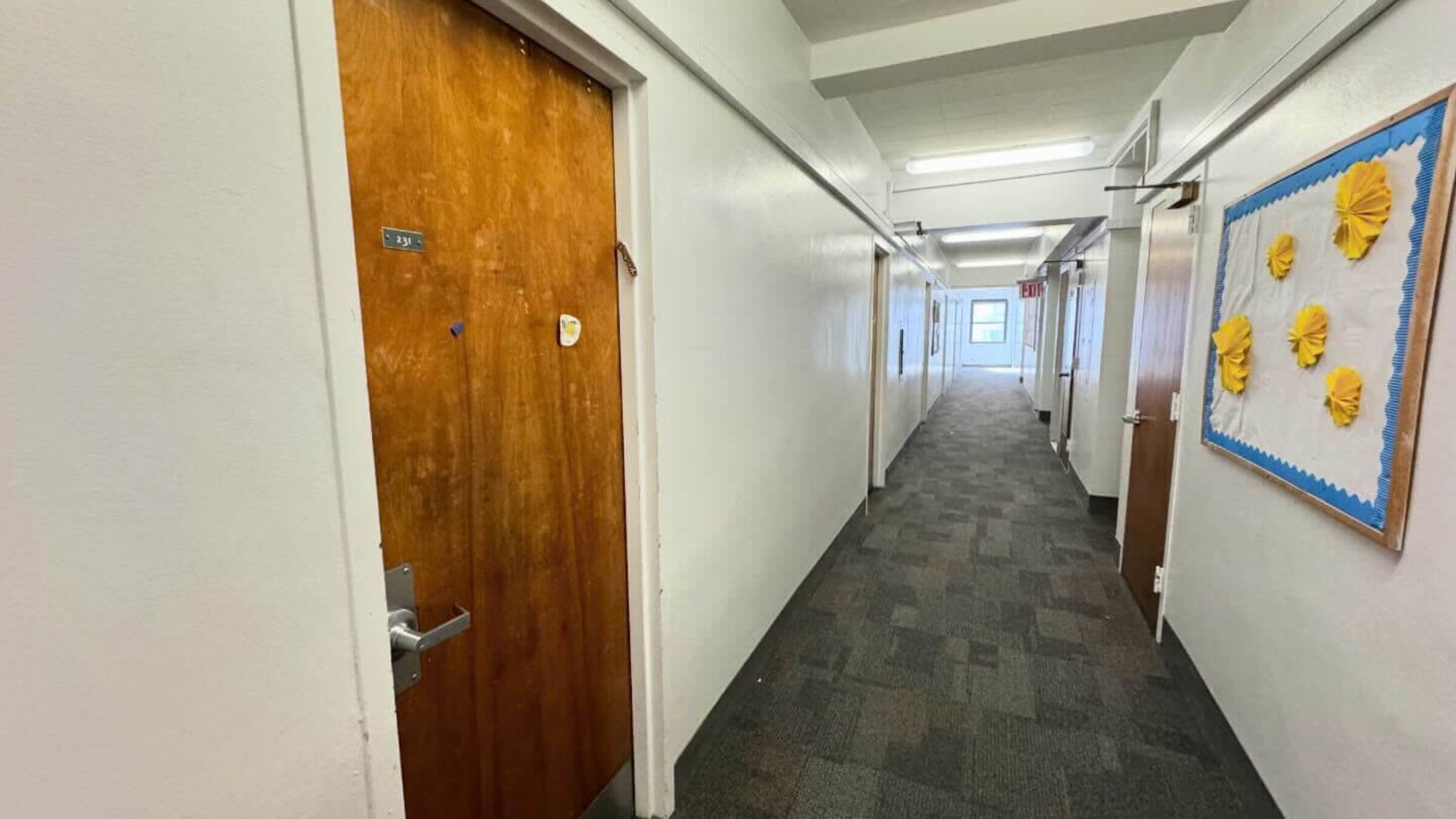Barnard’s draconian dorm-door policy threatens our democracy
‘When did the “unintended effects” of what someone says become more important than their right to say it?’

Yes, mezuzahs are still allowed under Barnard’s naked-door policy. Courtesy of Rachel Kaufmann
When my daughter and I toured Smith College on Presidents Day, our guides kept mentioning one particularly sweet tradition that has survived generations of change at the school.
Each first-year student is assigned a Big Sibling. During their first week on campus, Big Sibs stealthily decorate the doors of the newbies’ rooms to welcome them, adding personal gifts throughout the week that might hint at the giver’s identity. Secret Sibs are revealed at Friday afternoon tea, and the pairs often remain close even beyond their years on campus.
It’s a good thing we were at Smith, not Barnard, which this week enacted a ridiculous policy banning decorations from dormitory doors. Facing a lawsuit alleging they’ve failed to keep Jewish students “safe” during the Israel-Hamas war, Barnard administrators punted their responsibility to help students navigate the increasingly fraught boundaries between free speech and harassment, instead taking the Soviet route.
The dangerous lesson to young people: If a situation gets too messy, just erase it from view, lock it behind closed doors. And then, instead of living in a vibrant, variegated community of color and noise and ideas and arguments — otherwise known as a liberal arts college — we’ll all be stuck walking down drab dormitory hallways where all the doors look the same. Has it really come to this?
I went to college before cell phones, when dorm-room doors were not only canvases for self-expression but core communication tools. Oh, how lovely to come home to find a fresh message scrawled on your dry-erase board!
Meet me at Yorkside for midnight fries … Bagel brunch Sunday at kosher kitchen … Left your book on your desk … Mom called, needs to know what train you’re taking home for break … Come find me in Cross Campus Library, I’ll be the one drooling on the big orange chair…
I suppose text messages have made much of this kind of thing moot. But dorm-room doors were also where people put up posters about a play they were in or a food drive they were organizing. There were rainbow flags and religious symbols, Black power fists and sports team logos, holiday decorations and bumper stickers for political candidates or causes.
Friends festooned each other’s doors with surprise birthday wishes. Clubs tapped new recruits with coded door messages. You knew who lived where because of the silly-themed nameplates that Resident Advisers made to welcome folks each fall — and could sense the season based on how faded or worn they’d become.
Alas, no longer at Barnard. “While many decorations and fixtures on doors serve as a means of helpful communication amongst peers,” the dean wrote in an email announcing the new policy, which took effect Wednesday, “we are also aware that some may have the unintended effect of isolating those who have different views and beliefs.”
When did the “unintended effects” of what someone says become more important than their right to say it? That’s the literal inversion of the First Amendment.
It’s clear this is about Israel/Palestine. Barnard is one of a growing number of colleges and universities facing lawsuits accusing administrators of failing to protect students from severe antisemitism since Oct. 7.
The school has also cracked down on what can be hung on the quad after two students unfurled a pro-Palestinian banner there in December, and on what academic programs can put on their websites after women’s, gender and sexuality studies posted a “statement of solidarity with the Palestinian people” that referred to “settler colonial war” and apartheid. (Of course the faculty responded by creating their own website with the statement.)
Among the pre-crackdown signs on Barnard’s dorm doors were ones that said “Zionism is Terrorism,” “End the Genocide, Free Palestine,” and “Resist Colonial Power By Any Means Necessary.” Also, of course, “Kidnapped” posters of those held hostage by Hamas. There were doors adorned with kaffiyehs — and Israeli flags.
Can kids today really not handle walking by signs they disagree with — or even find deeply disturbing or offensive? Does that mean they also cannot live with — or even near — people who hold those views? Or they just…don’t want to know who their neighbors really are and what they think and feel and why?
As long as we all have the same drab, blank doors, everything must be OK.
I don’t want my kids to go to colleges where they can’t put dry-erase boards on their dorm-room doors. And I don’t want to live in a country where college administrators won’t wrestle with difficult decisions for fear of getting sued.
As I ranted about this to a colleague, she pushed back. What if a student with an unwanted pregnancy had to walk by a dorm-mate’s door that said “abortion is murder.” What if a student related to an Oct. 7 victim lives next to a sign saying “Hamas is the resistance?”
It seems to me they would be better prepared for life. Especially if instead of averting their eyes from the signs they tried to engage the people who put them up.
What if those signs led to one of those only-in-college all-night gabfests where the student with an unwanted pregnancy and the one with the anti-abortion poster and ones with relatives inside Israel and inside Gaza all told their truths? Or, better yet, what if they stayed up talking to each other about something totally unrelated, like Audre Lorde or Jean-Paul Sartre or the Russian Revolution or math?
And then the next morning, maybe they’d leave each other little follow-up notes on their dry-erase boards.
I’m not saying it’s not hard. It’s really, really hard to navigate the boundaries between speech and harassment. Another friend I bugged about Barnard this week asked, “What if they put up signs saying, ‘Jodi Rudoren, we accuse you of genocide’? Or signs with your picture?”
That’s basically what happened to the Jewish student body president of the University of Santa Barbara last weekend. The university took down the signs targeting her by name, and opened a discrimination investigation. They didn’t say nobody is allowed to ever put up another sign in the student center.
Meanwhile, UC Berkeley police have rightfully started a criminal probe into the anti-Israel protesters who broke a window and glass door and assaulted Jewish students on Monday night in a successful attempt to stop an Israeli military veteran from giving a speech. Those pro-Palestinian rioters might have wildly different agendas than Barnard’s dean, but the effects are exactly the same: to shut down speech.
I ran this by my friend Suzanne Nossel, head of PEN America and author of the 2020 book Dare to Speak: Defending Free Speech for All, and she took a slightly softer line.
The dorm should be “a sanctuary,” she said. “It’s not the same as the student center or out on the quad.” The war, she added, “is testing the principles” behind free speech because it’s clear that “some of this stuff is put up for the purpose of upsetting people” and there “has been a crossover into real-world violence,” and not just at Berkeley.
Suzanne was on her way to Stanford Law School for a conference “on restoring inclusive critical discourse on campus.” Because Barnard is hardly alone. As our Beth Harpaz reported last month, American University has banned flyers that are not specifically promoting campus events; Cornell is limiting where you can use a megaphone; and many places, like Barnard, are cracking down on what academic departments can put on their websites.
Which seems right to me: academic departments must be open and welcoming to all students, so their websites should list their courses and programs, not their politics. But the New York Civil Liberties Union has threatened to sue Barnard over its new policy there, too. It remains to be seen whether professors will be allowed to post things on their office doors. Like, say, office hours.
“The way this has worked for time immemorial is there have been informal notions of what is appropriate,” Suzanne noted. “That is the whole point of college. You have to feel that out and figure out how to live together. Shame that’s broken.”
Thankfully, some Barnard students are fighting back.
The school’s Resident Assistants wrote to its dean saying they “vehemently oppose” the new policy and noting that students use the doors “to express themselves with handmade artwork, posters promoting clubs and activities, and decorations showcasing their taste in music, movies, or other passions.”
They even mentioned my beloved dry-erase boards, which they said “serve to further these connections and promote engagement, with residents writing polls and playing floor-wide games that allow them to bond.” And they said that asking members of minority cultural or religious groups — hello, that includes Jews — to strip their doors represents “a personal attack on their individuality, ability to form community, and freedom of expression.”
I concur. Also with the student who put a picture of their door on Instagram that included a dry-erase board with the message: F__ Your Censorship.

















